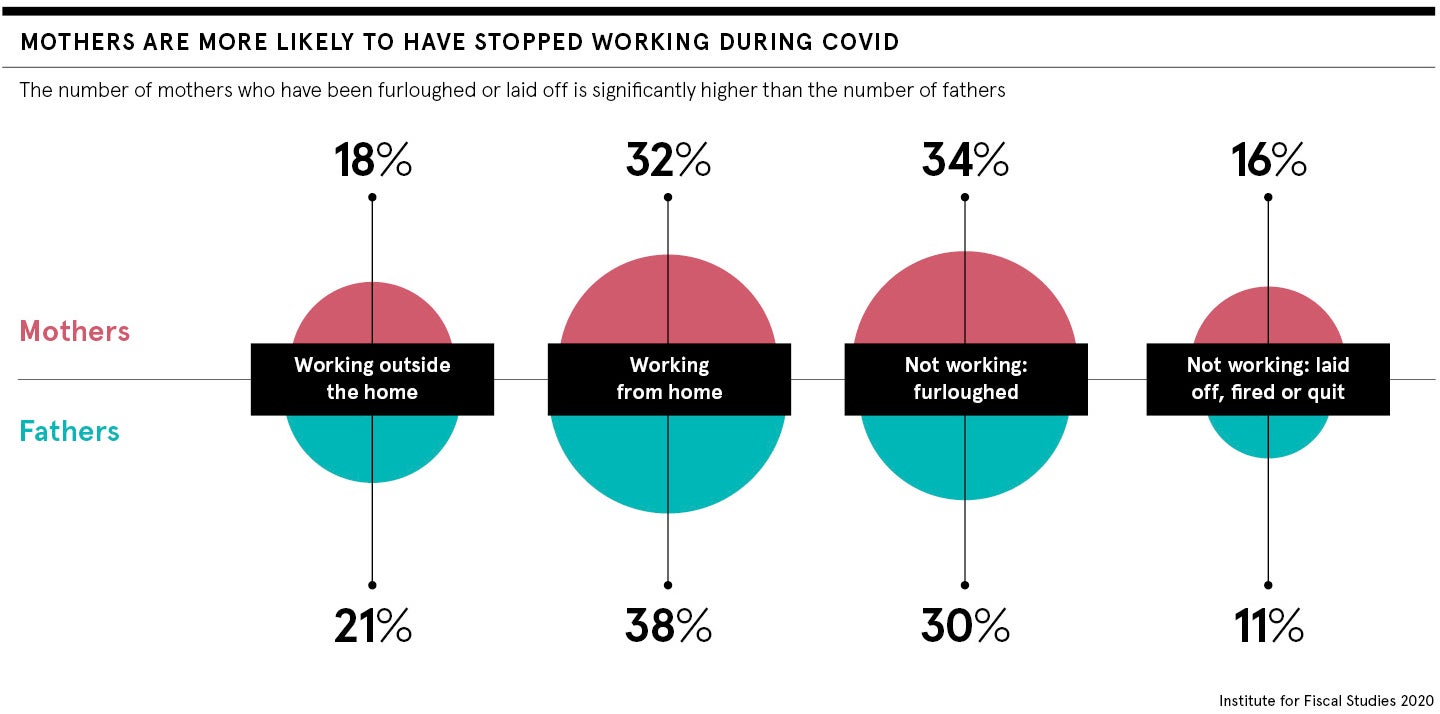
New fathers are thought to have been put off taking paternity leave during the coronavirus pandemic, fearful of losing their jobs.
With the UK’s unemployment rate set to rise above 7 per cent in 2021, according to the Organisation for Economic Co-operation and Development, experts believe fathers and non-birth parents could be less willing to take time off after a birth or adoption for some time to come.
“In terms of take-up of parental leave over the furlough period, I would expect there to be a significant decline in the numbers of people taking it,” says Jon Taylor, employment law specialist at EMW.
Taylor believes the economic uncertainty created by coronavirus would encourage workers to “keep their heads down and not create hassle for their employer”. Although there is no hard data yet to support this assertion, others share the same view.
“For people worried about losing their jobs or who are more at risk of becoming unemployed, I could imagine that such people would try to avoid paternity leave,” says Dr Christopher Rauh, lecturer in Economics at the University of Cambridge.
In particular, this would be the case for shared parental leave, which allows parents to split 50 weeks of leave after a birth or adoption, and is available beyond the statutory two weeks qualifying fathers and non-birth parents are entitled to when their child arrives. Beyond time off, paternity leave gives fathers the chance to connect with and feel responsible for their child.
It’s more than paternity leave and pay
Rauh says research shows the positive effects of paternity leave on the normalisation of gender roles. “When men take paternity leave, they are more likely to take on household duties and more likely to spend time with the children,” he says. “The risk [with the pandemic] is that we see a reversal of this, with the move away from traditional roles being put at threat by the crisis.”
In addition, women are more likely to have lost their jobs during the pandemic and so have taken on childcare responsibilities, says Rauh. His research indicates women were more likely to either initiate being furloughed or put on furlough, mainly due to their role as mothers.
“I suspect many thought it would be temporary, but it might lead to permanent changes in the gender balance because if you spend time out of work, it reduces your chances of getting work, and your wages, in the future,” he says.
Dads are home more but still working
Lockdowns have afforded many working fathers more time at home with their children. But this has largely been in place of the commute they no longer do, rather than a formal break from work and doing more around the home.
“Anecdotal evidence suggests the mother has still been the one expected to do all the home-schooling, while the father has worked from his home office,” says Helen Astill, managing director of Cherington HR, adding that while she had not witnessed a drop-off in statutory paternity leave, shared parental leave remained extremely rare.
Even before the pandemic, two thirds of new fathers were failing to take paternity pay in the year to March 31 because of the low level of statutory compensation.
At £151.20 a week, or 90 per cent of their average weekly earnings, whichever is lower, the financial disincentive is usually a crucial impediment to fathers taking paternity leave. And an economic downturn could exacerbate this.
The mother has still been the one expected to do all the home-schooling, while the father has worked from his home office
“The problem is that men often feel they need to fit into the societal role of the breadwinner for their family and, with a global crisis and an economic downturn to contend with, it can be hard to rationalise taking time off work when they could be earning money,” says Jamie Mackenzie at employee benefits specialist Sodexo Engage.
“Businesses therefore need to be sensitive to this fact when discussing paternity leave with employees and outlining the options on offer.”
Support those entitled to paternity leave
For companies keen to modernise their paternity leave policies, experts say it’s important managers listen to their staff about what they want.
FTSE 100-listed insurer Aviva offers all new parents a year’s leave with the first 26 weeks on full pay, something which has led to an equal 50-50 split in male and female staff taking parental-related leave in the year to the end of October.
Such a generous offer is rare in the UK, but Anthony Fitzpatrick, Aviva’s employee relations and global policy lead, says any improvement to parental leave policies is positive.
“Not every organisation can offer members of staff paid leave for 26 weeks, but if they listen and engage with their employees, they can make a small change that’s relevant to their company and affordable,” he says. “Small changes can make a huge impact on the lives of employees and their families.”

Understanding parents are equally responsible for the child
An important step is to make paternity and maternity leave packages consistent and ensure shared parental responsibilities are represented in a company’s culture.
Firms must also actively share information on paternity and shared leave, especially as research by meeting provider PowWowNow in March showed just a quarter (25.9 per cent) of firms provided details without being asked.
This lack of transparency could help explain why just 3.8 per cent of eligible couples applied to use shared parental leave in the 2018-19 tax year, according to HM Revenue & Customs.
And coronavirus isn’t helping. Jobs website DirectlyApply found the number of job posts on its site that mentioned paternity leave fell by 90 per cent between January and October this year.
Commentators agree the onus is on the individual to take parental leave. But they also believe workplaces must support fathers and non-birth parents to take leave to help in the drive for gender equality, something that will benefit everyone in the long run.

New fathers are thought to have been put off taking paternity leave during the coronavirus pandemic, fearful of losing their jobs.
With the UK’s unemployment rate set to rise above 7 per cent in 2021, according to the Organisation for Economic Co-operation and Development, experts believe fathers and non-birth parents could be less willing to take time off after a birth or adoption for some time to come.
“In terms of take-up of parental leave over the furlough period, I would expect there to be a significant decline in the numbers of people taking it,” says Jon Taylor, employment law specialist at EMW.
